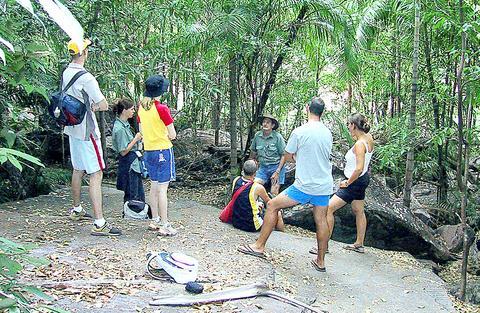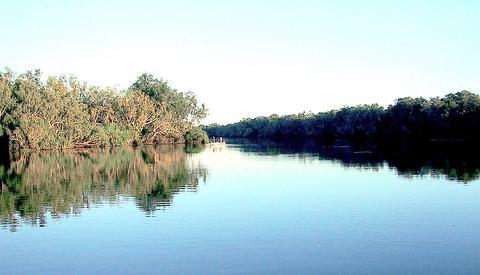It's been decades since hunting the crocodile-infested waters of northern Australia was a rite of passage for locals and an adventure holiday for rich tourists.
Now protected, they have an air of arrogance towards their former enemies.
Along the banks of northern Australia's South Alligator River, scores of crocodiles reaching lengths of up to 4.6m stretch their jaws or swim in the river's cloudy-brown waters, sensing little to fear from the occasional passing motorboat.

PHOTO: REUTERS
"They are proud devils," said Garry Lindner, who tracks crocodiles inside Kakadu National Park for Environment Australia, a government agency.
As Lindner steers a small aluminum speed boat around the peering eyes of partly submerged crocodiles along the 95km long river, a 22-caliber rifle close at hand, he speaks of the need for humans to keep their distance.
Attacks on humans are rare thanks to warning signs inside the park exhorting tourists to stay away from river edges and waterholes, known as billabongs.

PHOTO: REUTERS
Crocodiles are territorial and capable of leaping nearly their full length out of the water to attack prey. They have been known to capsize boats and canoes, says Lindner.
Lindner mostly relocates crocodiles to the dense mangrove swamps in the park's interior that are out of bounds to all but the most intrepid tourists, but he is sometimes forced to kill the animals, usually with a single shot, if they pose an immediate danger.
"If we've got to kill one, we will give the croc to the traditional land owners [Aborigines] who regard the meat, especially the tail, as a delicacy, though some people find it a bit fatty," said Lindner at his base in Jabiru, 3,200km northwest of Sydney.
Meat is murder
Word of a Lindner kill spreads quickly among the Aborigines, who are quick to stake their claim for the meat. However, the massive carcass of a crocodile that killed and nearly devoured a German tourist last year before being shot by Lindner sits untouched in a refrigerator near Lindner's office, where crocodile skulls rest on visitors chairs and are stacked atop files.
"No one wants it," he says.
Glenn Bernard Robless, a tour guide, pleaded guilty in March to making a dangerous omission that caused the death of 23-year-old Isabel von Jordan. He received a three-year suspended sentence. Von Jordan was taken by the 4.6m crocodile during a moonlight swim in a billabong.
The freshwater and saltwater crocodiles -- wrongly named since both species are at home in any type water -- have been protected from human predators since the 1960s, allowing their numbers to swell in the park.
Long gone are the likes of European royalty and car loads of young men from the area who killed thousands of crocodiles each year, sometimes chasing them across wetlands guns blazing, often with the blessing of cattle farmers who saw the reptiles as vermin.
But as the crocodile population inside the park recovers to more than 6,000 after decades of protection, fears of attacks on visitors are mounting.
Officials of Kakadu, a 20,700km2 reserve, have been forced to declare some of the most popular drawcards no-go zones after crocodiles were sighted on the prowl.
"Everyone wants to see a croc, but not up too close," says Tony Heenan, who runs daily treks through Kakadu's riverways and gorges.
Making a splash
Lindner said five large crocodiles were sighted in popular tourist swimming holes this year. Two were known to venture away from the area and one was removed, leaving two unaccounted for, he said.
"We know they are out there, we're just not sure where," Lindner said.
One of the most popular attractions, Twin Falls has been closed since the annual Big Wet ended in May due to crocodile sightings. June typically marks the start to the winter vacation season. Another popular spot, Jim Jim Falls, only opened in mid-June.
But even there, one of the first things day-trekkers encounter is a steel-mesh alligator trap, baited with chicken or pig parts, in hopes of snaring any unwanted reptiles before they reach the pitch-black waters of the popular plunge pool, eerily absent of all but a few daring bathers.

April 28 to May 4 During the Japanese colonial era, a city’s “first” high school typically served Japanese students, while Taiwanese attended the “second” high school. Only in Taichung was this reversed. That’s because when Taichung First High School opened its doors on May 1, 1915 to serve Taiwanese students who were previously barred from secondary education, it was the only high school in town. Former principal Hideo Azukisawa threatened to quit when the government in 1922 attempted to transfer the “first” designation to a new local high school for Japanese students, leading to this unusual situation. Prior to the Taichung First

The Ministry of Education last month proposed a nationwide ban on mobile devices in schools, aiming to curb concerns over student phone addiction. Under the revised regulation, which will take effect in August, teachers and schools will be required to collect mobile devices — including phones, laptops and wearables devices — for safekeeping during school hours, unless they are being used for educational purposes. For Chang Fong-ching (張鳳琴), the ban will have a positive impact. “It’s a good move,” says the professor in the department of

On April 17, Chinese Nationalist Party (KMT) Chairman Eric Chu (朱立倫) launched a bold campaign to revive and revitalize the KMT base by calling for an impromptu rally at the Taipei prosecutor’s offices to protest recent arrests of KMT recall campaigners over allegations of forgery and fraud involving signatures of dead voters. The protest had no time to apply for permits and was illegal, but that played into the sense of opposition grievance at alleged weaponization of the judiciary by the Democratic Progressive Party (DPP) to “annihilate” the opposition parties. Blamed for faltering recall campaigns and faced with a KMT chair

Article 2 of the Additional Articles of the Constitution of the Republic of China (中華民國憲法增修條文) stipulates that upon a vote of no confidence in the premier, the president can dissolve the legislature within 10 days. If the legislature is dissolved, a new legislative election must be held within 60 days, and the legislators’ terms will then be reckoned from that election. Two weeks ago Taipei Mayor Chiang Wan-an (蔣萬安) of the Chinese Nationalist Party (KMT) proposed that the legislature hold a vote of no confidence in the premier and dare the president to dissolve the legislature. The legislature is currently controlled